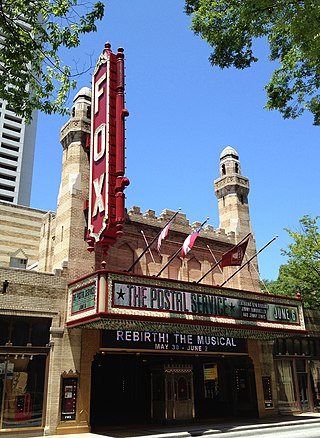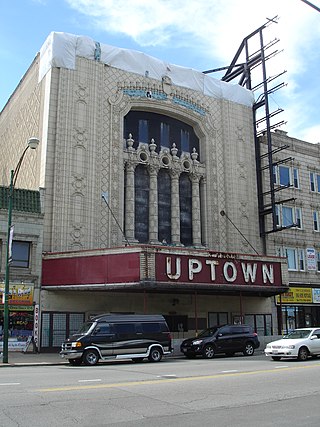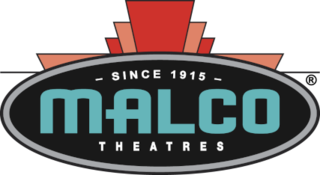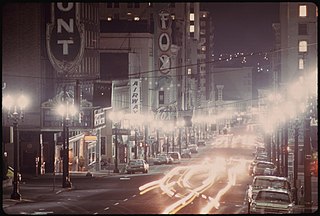
The Paramount Theatre is a 3,040-seat Art Deco concert hall located at 2025 Broadway in Downtown Oakland. When it was built in 1931, it was the largest multi-purpose theater on the West Coast, seating 3,476. Today, the Paramount is the home of the Oakland East Bay Symphony and the Oakland Ballet. It regularly plays host to R&B, jazz, blues, pop, rock, gospel, classical music, as well as ballets, plays, stand-up comedy, lecture series, special events, and screenings of classic movies from Hollywood's Golden Era.

The Tennessee Theatre is a movie palace in downtown Knoxville, Tennessee. The theater was built in 1928 in the 1908 Burwell Building, considered Knoxville's first skyscraper. The theater and Burwell Building were added to the National Register of Historic Places in 1982, and the theater was extensively restored in the early 2000s. The Tennessee Theatre currently focuses on hosting performing arts events and classic films, and is home to the Knoxville Opera and the Knoxville Symphony Orchestra. The theater is managed by AC Entertainment.

The Tampa Theatre is a historic U.S. theater and city landmark in Downtown Tampa, Florida. Designed as an atmospheric theatre-style movie palace by architect John Eberson, it opened on October 15, 1926. The theatre features a wide range of independent, foreign, and documentary films. It is Tampa's only non-profit movie palace, and operating costs are supported by its members, donors, and corporate sponsors, as well as by ticket and concessions sales. It has often been used as a backdrop for movies, music videos, and local programming.

The Fox Theatre, a former movie palace, is a performing arts venue located at 660 Peachtree Street NE in Midtown Atlanta, Georgia, and is the centerpiece of the Fox Theatre Historic District.

A movie palace is any of the large, elaborately decorated movie theaters built between the 1910s and the 1940s. The late 1920s saw the peak of the movie palace, with hundreds opening every year between 1925 and 1930. With the advent of television, movie attendance dropped, while the rising popularity of large multiplex chains in the 1980s and 1990s signaled the obsolescence of single-screen theaters. Many movie palaces were razed or converted into multiple-screen venues or performing arts centers, though some have undergone restoration and reopened to the public as historic buildings.

The Fox Theatre is a performing arts center located at 2211 Woodward Avenue in Downtown Detroit, Michigan, near the Grand Circus Park Historic District. Opened in 1928 as a flagship movie palace in the Fox Theatres chain, it was at over 5,000 seats the largest theater in the city. Designed by theater architect C. Howard Crane, it was listed on the National Register of Historic Places in 1985.

The Stanley Theater at Kennedy Boulevard and Pavonia Avenue is near Journal Square in Jersey City, New Jersey.

The Chicago Theatre, originally known as the Balaban and Katz Chicago Theatre, is a landmark theater located on North State Street in the Loop area of Chicago, Illinois. Built in 1921, the Chicago Theatre was the flagship for the Balaban and Katz (B&K) group of theaters run by A. J. Balaban, his brother Barney Balaban and partner Sam Katz. Along with the other B&K theaters, from 1925 to 1945 the Chicago Theatre was a dominant movie theater enterprise. Currently, Madison Square Garden, Inc. owns and operates the Chicago Theatre as a 3600 seat performing arts venue for stage plays, magic shows, comedy, speeches, sporting events and popular music concerts.

The Fox Oakland Theatre is a 2,800-seat concert hall, a former movie theater, located at 1807 Telegraph Avenue in Downtown Oakland. It originally opened in 1928, running films until 1970. Designed by Weeks and Day, the theatre is listed on the National Register of Historic Places. It was refurbished in the 2000s and reopened as a concert venue on February 5, 2009.

The Paramount Theatre was a 3,664-seat movie palace located at 43rd Street and Broadway on Times Square in Midtown Manhattan, New York City. Opened in 1926, it was a showcase theatre and the New York headquarters of Paramount Pictures. Adolph Zukor, founder of Paramount predecessor Famous Players Film Company, maintained an office in the building until his death in 1976. The Paramount Theatre eventually became a popular live performance venue. The theater was closed in 1964 and its space converted to office and retail use. The tower which housed it, known as the Paramount Building at 1501 Broadway, is in commercial use as an office building and is still home to Paramount Pictures offices.

Malco Theatres, Inc. is a movie theatre chain that has remained family owned and operated for over one hundred years. It has been led by four generations of the Lightman family. The company has 36 theatre locations with over 371 screens in six states. Malco also operates three bowling centers and a family entertainment center in southern Louisiana and a family entertainment center in Oxford, Mississippi.

The Brooklyn Paramount Theater is a former movie palace at 1 University Plaza at the intersection of Flatbush and DeKalb Avenues in downtown Brooklyn, New York. Opened in 1928, the building has been owned by Long Island University (LIU) since 1954. Converted for use by LIU as classroom space and a gymnasium, the building retains much of the theater's original decorative detail. Until recently the venue operated as a 1200-seat multi-purpose arena, formerly home to the Brooklyn Kings basketball team. As of 2017 it was in the planning stages of a renovation to reopen the theater as a performing arts venue in 2019.
The Capitol Theatre is a theatre operating in Rome, New York. It opened December 10, 1928 as part of the Kallet chain of movie houses, presenting first run films until it closed in 1974. After extensive renovation, the theatre re-opened in 1985 as the non-profit Capitol Civic Center, offering classic films, live theatrical performances, and concerts.

The Rivoli Theatre in South Fallsburg, New York, United States is located at the intersection of NY 42 and Laurel Avenue. It was built in 1923, renovated in the late 1930s and remains almost intact from that period.

The Oriental Theatre was a movie theater located at 828 SE Grand Street in the East Portland commercial district of Portland, Oregon that was built in 1927. The Oriental was a 2,038-seat movie palace designed by Lee Arden Thomas and Albert Mercier. The building's exterior was in the Italian Renaissance style. The interior had an "almost surreal appearance" created by interior designer Adrien Voisin. It was built by George Warren Weatherly. Demolished in 1970, the theater was adjacent to the Weatherly Building, which remains standing.

The State Theatre is a historic theater located at 609 Congress Street in downtown Portland, Maine, which features a combination of Moorish and Art Deco architecture. It reopened as a 1,870-seat performing arts venue in 2010.

The Tivoli Theatre, also known as the Tivoli and the "Jewel of the South", is a historic theatre in Chattanooga, Tennessee, that opened on March 19, 1921. Built between 1919 and 1921 at a cost of $750,000, designed by famed Chicago-based architectural firm Rapp and Rapp and well-known Chattanooga architect Reuben H. Hunt, and constructed by the John Parks Company, the theatre was one of the first air-conditioned public buildings in the United States. The theatre was named Tivoli after Tivoli, Italy, has cream tiles and beige terra-cotta bricks, has a large red, black, and white marquee with 1,000 chaser lights, and has a large black neon sign that displays TIVOLI with still more chaser lights.
The Golden State Theatre in Monterey, California, opened on August 6, 1926.

The Fox Theatre was a theatre building located at the intersection of Southwest Broadway and Taylor Street in Portland, Oregon, in the United States.


















